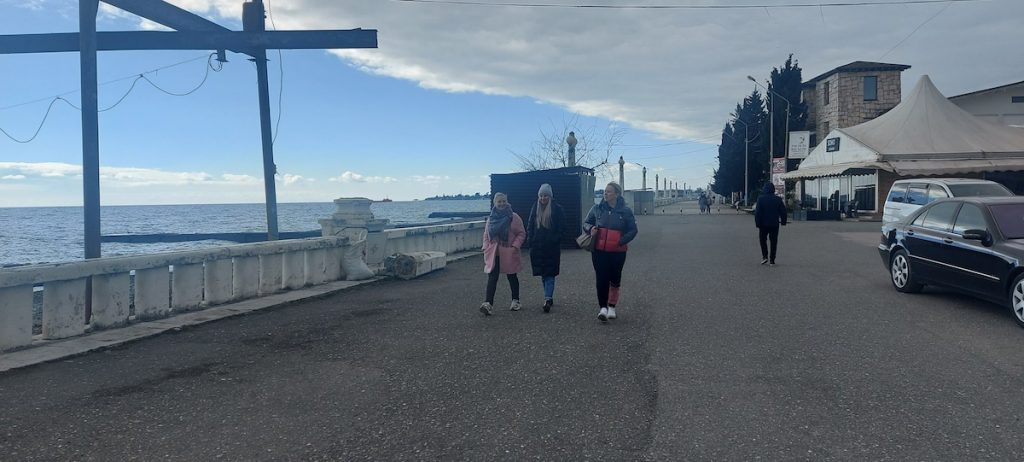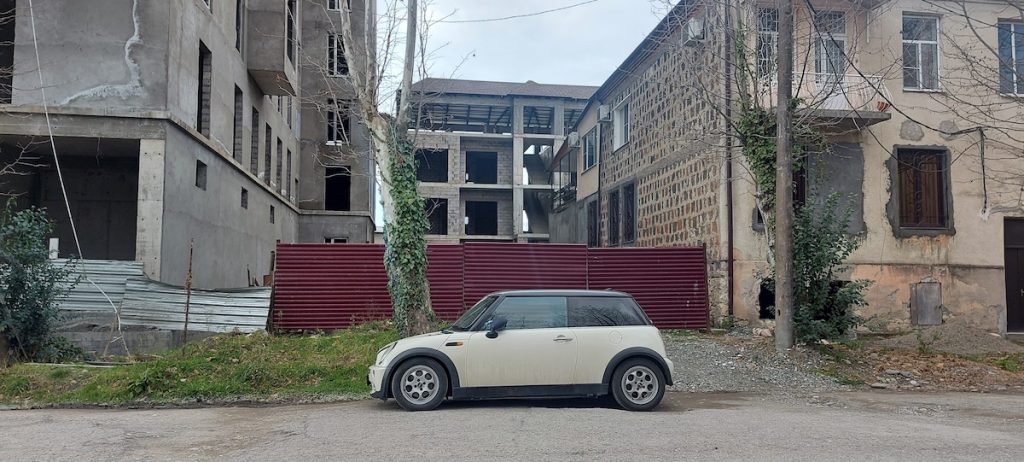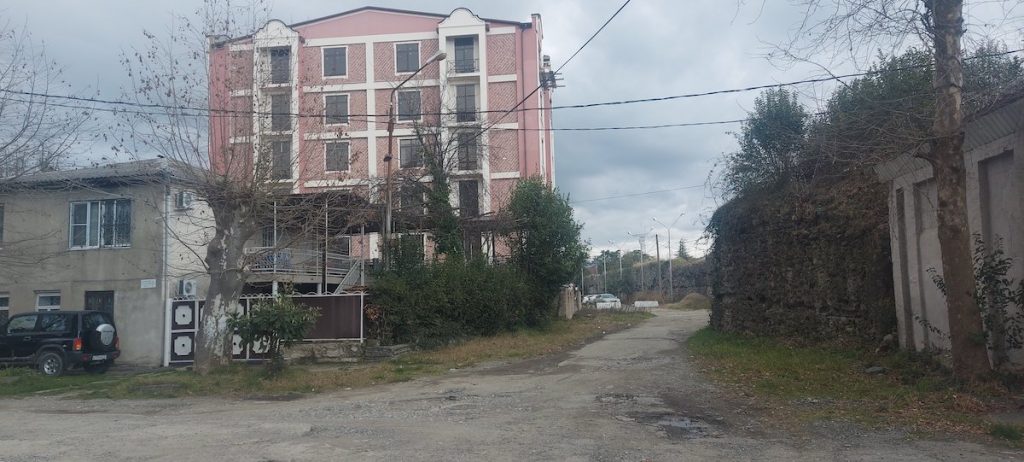Sell real estate to foreigners in Abkhazia? To lift or keep the ban
Sell real estate to foreigners in Abkhazia?
The sale of real estate to foreigners in Abkhazia is one of the most painful topics for the Abkhaz public.
The issue of lifting the ban on the sale of housing to foreigners periodically comes up on the agenda and becomes the cause of heated political debate.
In addition, the further development of relations with Russia largely depends on this decision.
Despite the dissatisfaction of some politicians and society, in Abkhazia they are discussing options for easing this restriction.
According to the current law, foreigners cannot purchase real estate in Abkhazia.
Only citizens of the republic have this right.
Nevertheless, such transactions are constantly taking place with the help of various schemes, in which the rights of the new owner initially become rather precarious.
There are quite a few cases when the acquirer (mostly Russians) is later simply ‘thrown’ by those on whom they’ve registered their property.
The Russian media regularly write about the scandalous ‘housing’ issue in a negative tone for Abkhazia, and as a result, this problem has become, perhaps, the most painful one in relations between Moscow and Sukhum.
The Kremlin has regularly sent signals to the Abkhaz authorities about the need to lift the ban on the purchase of real estate for Russians, and, as a rule, official Sukhum has not disregarded them. However, as soon as the Abkhaz officials at home carefully began to propose to revise the existing taboo, the authorities immediately faced serious resistance both in political circles and at the public level, after which the issue was placed on the back burner.
Why the sale of land to foreigners is an uncomfortable idea for Abkhazia
The most important argument in favor of the fact that the ban cannot be lifted is the small number of Abkhaz.
By the end of the Soviet period, ethnic Abkhaz accounted for only 17 percent of the total population of the republic. And if foreigners are allowed to buy real estate in the country, the Abkhaz are afraid that Russians will come and, having bought houses and apartments, will noticeably change the ethnic picture of Abkhazia that has existed since the end of the 1992-93 Georgian-Abkhaz war, where the Abkhaz themselves now constitute the majority of the population.
“As soon as at least a percentage of Russians get a house on the Abkhaz coast, and this is almost one and a half million people, it’ll be hard to find a single Abkhaz. After all, the entire current population of Abkhazia is only 240,000 people,” says journalist Inal Khashig.
What Russia wants
Despite the concerns of the Abkhaz, Moscow continues to insist.
In 2020, this topic of real estate has surfaced in a new context. The parliament of Abkhazia received from President Aslan Bzhania a list of proposals for the harmonization of Abkhaz and Russian legislation, consisting of almost fifty points. This list was prepared by Moscow, and, as they say on the sidelines of the Abkhaz authorities, the size of further financial assistance to Abkhazia directly depends on the solution of the problems appearing there.
One of the items on this agenda: “amendments to the current legislation of the Republic of Abkhazia in terms of granting citizens of states that have recognized the independence of the Republic of Abkhazia the right to acquire real estate in the territory of the Republic of Abkhazia.”
The opposition, through the mouth of MP Natalie Smyr, called this bill a threat to the national security of Abkhazia. And they agree with this not only in the opposition environment, but also among the supporters of the current government.
Therefore, no one speaks about the unconditional lifting of restrictions, but there are proposals to slightly weaken the ban.

In particular, Natela Akaba, who today heads the constitutional reform commission, believes that the allocation of certain territories in the most depressed regions of Abkhazia in the east of the country for the construction of apartments for foreigners would have a positive impact on job creation and economic growth in this part of the republic.
“At the same time, taking into account the peculiarities of the republic, it is necessary to approach this issue very responsibly: to think over the quotas for apartments, and also to individually consider each potential buyer”.
Despite the cautious approach, Akaba’s idea was heavily criticized on social media, but it also served as a reason for discussion on this topic at more than one round table.
Summer cottage by the sea
Denis Belozorov (name has been changed) comes to his house in Sukhumi about twice a year. It is located in a picturesque area of Sukhum on a hill overlooking the Sukhum bay. The house is registered in the name of a neighbor, a local resident. He looks after the house when the actual owner is at home in Moscow.
For the first time Denis came to Abkhazia as a tourist. According to him, he immediately realized that he would like to spend more time in Abkhazia and, perhaps, even find a job.
“I have two apartments in Moscow, both of which I inherited. I rent one, in the other we live with my parents. Rent in the capital of Russia, which I receive monthly from my tenants, allows me not to work at all today. Therefore, this would be enough for me both to rent an apartment in Sukhum and to live on it. But I wanted to have my own: a garden, a vegetable garden, a place where retired parents could come for a long time, and consider it their home,” says Denis.
He was looking for a good option for a long time, staying in Sukhum for more than a year, stopped at a large plot with a dilapidated house. The house was demolished, and on his own, with the help of friends whom he had made in Abkhazia in a year, he built a small but two-story house with a large balcony. This was exactly 10 years ago. Today he has a blossoming garden with fruit and ornamental trees and shrubs.
Now Denis visits his Sukhum “hacienda” on short visits. The child went to school, and Denis and his wife decided that their son would study in Moscow, although he was born in the Sukhumi maternity hospital.
His mother now constantly lives in the Sukhumi house, she made friends with the neighbors, who are becoming more and more every year. And mostly they are visiting people.
“In the last year, a lot of people have come from the Murmansk region,” says Denis. “They have very high northern pensions there, so they buy their own housing here, where it is cheap, the sea and it is warm all year round.”

About once every four months, a commission on citizenship is held in the administration of the President of Abkhazia. Most of those who want to get an Abkhaz passport are Russian pensioners.
All of them come to the administration building on the appointed day and wait to be invited for an interview.
“I’m coming for the third time,” a 70-year-old pensioner from St. Petersburg complains. “I can’t pass the exam in the Abkhaz language”.
When asked why she needed all this at such a respectable age, the woman admits without a shadow of guile that she wants to take over the three-room apartment, which she acquired in the center of Sukhum, in order to then leave it as a legacy to her grandson.
Only through the court
The housing issue among visitors in Abkhazia is so acute that it comes to litigation, where, as a rule, the plaintiff and the defendant are relatives or close friends.
For example, the housing issue quarreled between two closest friends Olga Bryukhanova and Yulia Teterina.
Teterina in 2009 with her husband Anatoly arrived in Abkhazia. They saw an advertisement for the sale of a house in Sukhum. The low cost of the house suited the spouses, they paid the owner of the house, Daut Kvitsinia, one million seven hundred thousand rubles [about $23,000].
Then Kvitsinia gave them power of attorney for the right to manage and dispose of the house, but they did not draw up a receipt for money or a sale and purchase agreement.
Having decided that the deal took place, the Teterins renovated the house, bought furniture and began to live in it as real owners. Six years passed, and Kvitsinia asked the Teterins to register the house for one of their acquaintances.
By that time, Julia Teterina had made friends with her neighbor Olga Bryukhanova. Teterina shared the problem with her friend, who invited her to register the house for her. Julia collected all the necessary documents and, having met at the notary, Kvitsinia and Bryukhanov concluded an imaginary deal.
And in March 2019, Olga Bryukhanova filed a lawsuit with the Sukhum city court to reclaim this house from the illegal possession of Yulia Teterina.
You can find many such stories in the Abkhaz courts.
Having passed several instances, the trial brought Bryukhanova herself to court. Now she is accused of fraud.
Pros and cons
This is partly why in Abkhazia they again began to publicly discuss the topic of selling real estate to foreigners, but with reservations in the form of selling apartments without the right of registration and acquiring citizenship.
The issue of selling real estate is being discussed by members of the Public Chamber, an advisory body to the president, scientists, businessmen and public figures.
Businessman and member of the Public Chamber Abesalom Kvarchia believes that the development of depressed regions and the sale of real estate are inseparable concepts from each other. Since it is impossible to attract investors without giving them the opportunity to purchase residential real estate in Abkhazia, as which he offers apartments. That is, complexes in which housing will be registered in the ownership of foreigners without citizenship and the possibility of registration.
According to him, a similar practice exists in many European countries.
“Watching how the once mining town of Tkuarchal is dying out and how trees are sprouting on high-rise buildings, and being inactive is no less a crime than selling real estate,” Kvarchia said.
Kvarchia’s colleague in the Public Chamber, Rismag Ajinjal, is sure that selling real estate to foreigners is a waste of a strategic resource.
“Why tie up the development of the area and the sale of real estate?” he wonders.
“After all, there is a scheme created by (the first president) Vladislav Ardzinba of joint ventures. The investor sets up a business with a local resident, and then does all his business. This circuit can work effectively. But we do not have a normal state. I don’t trust officials. If the existing mechanism does not work, do you think another will work?”
According to Rismag Ajinjal, first of all, it is necessary to adopt an anti-corruption law and only after that develop any development strategies and implement investment projects.
“Depressed Tkuarchal is of no interest to anyone,” says Ajinjal, “everyone wants to go to Gagra, Pitsunda and Sukhum. And if the taboo is removed, nothing will definitely change in Tkuarchal, but our officials and the presidential administration building will be sold as a hotel.”
A public figure, a farmer and a resident of the city of Tkuarchal Kadyr Argun believes that the topic of real estate should not be discussed at all now, because more pressing issues are on the agenda today. Such as medicine, employment and housing for young Abkhaz families.
“We are constantly being told that we need to allow the sale of real estate to foreigners, because we need their investment. But we have a large diaspora, and there are many large businessmen among the Abkhaz, let us propose projects to them. They can buy up all of Abkhazia if they want. But they don’t. This means that the problem lies elsewhere,” said Kadyr Argun.

According to him, if the authorities really want development, they must support the countryside, agriculture and local producers.
Lawyer Frida Lazba is not so categorical. She believes that there is nothing wrong with selling apartments without citizenship.
“We have a thriving illegal real estate market today. Russians buy apartments, register them in the name of local Abkhaz, or do not register them at all. And as a result, nothing goes to the budget as taxes,” says Lazba.
She believes that the mechanism for selling housing needs to be finalized together with Russian specialists. In addition, according to Lazba, the liberalization of the real estate market will solve the problem of the lack of specialists in various fields.
“We have good Soviet experience. When specialists who came to develop various industries received apartments. This is how the Sukhumi Institute of Physics and Technology was created, where space-scale projects were implemented,” says Lazba.
Political question
However, despite another round of internal Abkhaz discussion on the problem of real estate, the authorities clearly understand that it is simply impossible to resolve this problem without serious internal political upheavals.
The republic has been experiencing an acute internal political crisis for many years, as a result of which the two previous presidents, Alexander Ankvab and Raul Khadzhimba, were prematurely removed from office.
And the current president, Aslan Bzhania, clearly does not intend to repeat the fate of his predecessors for the sake of lifting the ban.
Nevertheless, the issue of allowing Russians to acquire real estate in Abkhazia will still be on the list of Moscow’s main ‘wishes’.
Terms, place names, opinions and ideas suggested by the author of the publication are her / his own and do not necessarily coincide with the opinions and ideas of JAMnews or its individual employees. JAMnews reserves the right to remove comments on posts that are deemed offensive, threatening, violent or otherwise ethically unacceptable.


















